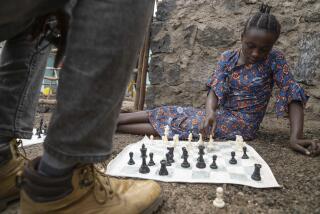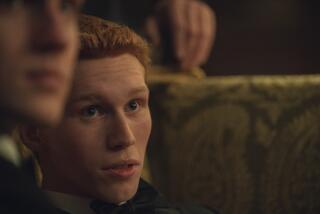His Fans Stop Searching for Bobby Fischer : Chess: Hollywood teen-ager seeks world youth title. Even without it, the son of poor Armenian immigrants has a fairy-tale story.
- Share via
His unemployed parents wait in a tiny Hollywood apartment with nothing on the walls but their son’s picture, with little by way of decor save for his shining chess trophies.
This is the week they’ve waited for, hoped for, sacrificed for, since the family, who is on welfare, came from Armenia seven years ago. Onik Akopyan, 55, who only speaks a few words of English, says he can’t remember the last time he bought his wife a new dress. “No money,” he said. “I don’t have jobs. I’m an old man.”
No money for extras--but always money for his 14-year-old son’s chess lessons.
This is the week when Harry Akopyan gets his shot at “champion of the world,” his exuberant father says, throwing up his arms in a “V” for victory.
This week, thanks to Chess for Juniors, Harry will represent the United States at the 1995 FIDE World Youth Championship in Sao Lourenco, Brazil.
His Huntington Beach coach, who knew his family could not afford to send him, found a sponsor to pay for his trip: David Huff, the father of the Irvine boy who twice placed second to Harry in the national championships.
“He’s the Michael Jordan of the chess world,” said David Huff, 51. “Harry can take one step from mid-court and dunk, except he does it in chess. . . . Do you resent that or just take a step back and say, ‘My God, how do you do that?’ ”
Harry’s story is not just about chess. It’s a story of sportsmanship, of pride, of a family’s struggle.
It’s the story of a boy who came out of nowhere to win an unprecedented six national juniors titles, with no losses or draws in 39 straight games. It’s a story that is just beginning, as Harry plays in his first overseas competition, which starts Tuesday and ends Oct. 28.
He will face internationally ranked teen-agers all vying to be The One--the next Bobby Fischer or the next Garry Kasparov, who just took home the $900,000 first prize in the world professional chess tournament (The junior champions will get medals).
Harry doesn’t play for trophies. He has too many trophies to display in his family’s two-bedroom apartment, off a gritty stretch of Sunset Boulevard, so he stores most of them in his uncle’s garage.
He says he plays for “honor. It makes me proud of myself when I’m good.”
Harry practices in the living room, where he and his father sleep on cots. He lives with his father, mother, grandmother, sister and a 16-month-old nephew.
In Hollywood, his family awaits a telephone call from Brazil for word of Harry’s daily results just as they had for Harry’s national tournaments, which they did not attend because they could not afford the travel expense.
Akopyan, a wiry man who chain smokes his way through Harry’s local tournaments, says he feels “very good” about his son’s trip sponsor. He will be “happy too much,” if his son wins the world title.
Harry’s father, who used to work as a gas company repairman, taught Harry to play when he was 5 years old in Armenia. He picked up the game quickly and took time out from playing dodge ball or climbing trees to watch his father play chess with their neighbor.
Checkmate in two moves, the boy would say. Or: white is going to win.
His father enrolled him in chess school, and Harry started to win local tournaments. But his chess career was interrupted at age 7 when his family moved to Hollywood to join relatives.
Harry’s father says he cannot find a steady job. His mother, Emush Akopyan, could not work because she has problems walking. As the family settled into a new country, Harry learned English at school and looked for a chess club. Once, he stopped at a pawn shop to look for opponents, thinking the place was named after the chess piece.
He almost gave up until he happened to see national master Robert M. Snyder on the Armenian news in January, 1991. His sister, Anahit Akopyan, 22, tracked down Snyder at Chess for Juniors, which has produced more national youth champions--19 first-place winners--than any other chess club in the country.
Within two months, Harry was the state’s elementary school champion. For fun, he played three kids while blindfolded--and beat them all--and he beat old men at speed chess at a doughnut shop near his home. At a Westminster Mall exhibition, a restaurant offered a free hamburger and fries to anyone who could beat Harry--no one could. At age 11, he won his first two national championships and then won two a year after that.
“There is no more talented a player in the United States than Harry, and no player that has as much potential,” said Snyder, author of the best-selling Random House book “Chess for Juniors.”
At a tournament this summer, Synder saw Harry start a game in rare bad form, just as the club’s title was on the line in a match against all-star players from Northern California. Then, in a series of good moves, Harry recovered from a terrible position and won.
“Sometimes, not only playing the game and crushing the opponent from the beginning is important but also getting yourself out of a bad mess,” Snyder said. “That’s where his ability is--to not give up and to fight, even from behind.”
“Harry is a tiger,” said Richard Peterson, a chess expert in Arizona who runs a national scholastic chess competition. “Once he has a small advantage, he doesn’t let go. If you can imagine a tiger with his paw on the tail of a mouse, slowly deciding how he’s going to dissect his poor victim. . . . That mouse never gets away.
“Harry could become a grandmaster. Harry’s a perfect player.”
Harry describes his play as “average.” Homework comes first, he insists, and then chess.
He likes to watch “Perry Mason” and other courtroom dramas on TV. And he likes to read Stephen King horror novels. He also likes pizza and Ping-Pong. He adores his nephew, whom he swings in the air and covers with kisses. At Thomas Starr King Middle School, he plays clarinet in the band and gets straight A’s in honors classes. Most of the kids at school don’t know he plays chess. His best friend doesn’t play chess.
Harry is patient and answers questions politely, with a direct gaze. But he volunteers nothing and gives short answers. He rubbed his eyes and stared into the distance when asked what’s fun about chess.
“What is fun?” Harry wondered aloud. He paused for 15 seconds.
“Mostly,” he said softly, “I like the challenge. When the game is played very beautifully, by giving up your major pieces for a minor piece, but then you know that in another two or three moves, you’re going to make a brilliant move--that’s very nice.”
Those who know Harry’s play say he’s on the cusp of greatness.
He has won one more juniors title than international master Josh Waitzkin, whose boyhood rise through the chess ranks was portrayed in the movie, “Searching for Bobby Fischer.”
“Why isn’t Harry Akopyan in ‘Searching for Bobby Fischer?’ ” asked David Huff. “Nobody’s ever done what Harry’s done--he’s done way better than Josh Waitzkin.
“I think the kid has the potential to be a world champion. Wouldn’t it be nice to say, ‘I knew Harry way back when. . . .’ ”
At the world games, Harry will face a field of 40 to 60 competitors in the 14-years-old-and-under category, which includes teen-agers who are already grandmasters, the highest international rank. Harry is a master, the second-highest rank in the United States and in the top 8% of 82,000 competitive players in the country. But he is not on the world chess federation’s list of top 20 juniors.
“Our players definitely have their work cut out for them,” said Eric C. Johnson, an assistant director for the U.S. Chess Federation, which is sending four other youths to represent the U.S. in different age categories.
As soon as coach Snyder heard Harry was invited to Brazil, he turned to Huff for help; Huff offered $1,000, to go along with Harry’s $500 stipend from the U.S. Chess Federation.
In the past five years, Snyder has raised money, from corporate sponsors and donations, to help send Harry to state tournaments. In return, the family has invited Synder, along with Huff and his son, to their home for Armenian dishes including Emush Akopyan’s homemade butter-rich gata, a flaky pastry.
Alexander Huff, 14, said he’s happy his dad is sending Harry to Brazil. Alexander, who is also a top-ranked player, has roomed with Harry at national tournaments.
“He’s just too nice to be jealous of,” said Alexander.
Twice a week, to supplement his training in Huntington Beach, Harry takes group lessons with Nshan Keshishian, a national master who teaches at an Armenian church in Hollywood. Keshishian is paying his own way to accompany Harry to Brazil.
One night, Harry played more than a dozen games of five-minute speed chess in Keshishian’s garage, where the group temporarily plays while the church undergoes earthquake repairs.
Harry and his 16-year-old opponent play while jive talking in Armenian, banging the timer on their clocks, moving so quickly that they knock other pieces down. At one point, Harry moves his queen straight across the board in front of his opponent’s black king, which is blocked in by rooks. He meets his opponent’s eyes and grins; his opponent smiles sheepishly. Without speaking a word, both clear the pieces and start again.
Harry says he doesn’t get nervous before most games. Sometimes, in four-hour tournament games, he relaxes by eating a Snickers bar or splashing cold water on his face. He admits to a few butterflies before the world championships, where he will play nine games. Before he left Friday, he prepared by playing chess against a computer that he won in a tournament and by studying chess problems in books.
“I feel excited,” Harry said. “I feel happy . . . if I’m going all the way to Brazil, at least I should do something. “
Like what?
“I want to win.”
More to Read
Go beyond the scoreboard
Get the latest on L.A.'s teams in the daily Sports Report newsletter.
You may occasionally receive promotional content from the Los Angeles Times.










